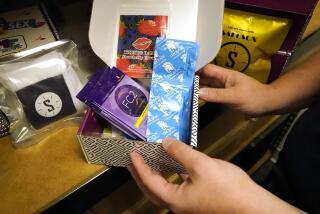Teen Activists Diverge on Issue of Sex
- Share via
Few subjects roil adults like the collision of kids and sex, and it seems our kids are just as divided.
Listen to Jonathan Knepper and Mahshid Rezapour, two young leaders on the emotionally charged issue of indiscriminate teen pregnancy.
For Jonathan, the solution lies in abstinence. “It’s hard, but it’s worth it,” says the junior at La Canada High School. “You can have tons of sex, but it’s going to catch up with you.”
For Mahshid, the solution lies in sex education. “You can’t all of sudden eliminate pregnancies by abstinence. It’s not realistic,” says the junior at University High in West Los Angeles. “If you’re going to have sex, be careful and be aware of your options.”
Jonathan is part of a teenage educational theater troupe that travels the region promoting a message of chastity. Mahshid is a fledgling social activist who recently helped conduct a statewide survey on kids and sex. She belongs to an advocacy program that lobbies lawmakers and school boards for more comprehensive education that covers abstinence and contraception.
Though the pair hold disparate views, they share a common experience: living in a supercharged world that treats sex like a weekend hobby. It’s a world where sexual behavior--responsible or not--is the norm.
One of every two high school students in the United States has had sex at least once in their lives, according to a 1999 survey by the federal Centers for Disease Control and Prevention. That was a small decrease compared to 1991.
Meanwhile, condom use increased dramatically over the same period, with 58% of students using the contraceptive during their last encounter in 1999, compared to 46% in 1991, the figures show.
Researchers believe that both factors have played a role in what they consider good news--the declining birthrate among teenagers in the 1990s--although no one seems to agree which factor is more responsible.
“Teenagers are doing more of the things that matter when it comes to preventing pregnancy,” said Bill Albert, a spokesman for the nonprofit National Campaign to Prevent Teen Pregnancy.
You will not hear much of this in schools, which almost universally emphasize a message of abstinence and downplay the role of contraception.
Classes in California that broach sex education are required by law to emphasize abstinence as “the only protection that is 100% effective against unwanted teenage pregnancy, sexually transmitted diseases and AIDS when transmitted sexually.” The instruction also delves into the hazards of sexually transmitted diseases and the emotional consequences of unwanted pregnancies. In addition, kids learn about the success and failure rates of condoms and other forms of contraception.
Separate from sex education, schools are required to teach about AIDS prevention.
A survey conducted by Mahshid and her fellow students found teenagers crying out for more information than we are giving them.
The nonprofit California Center for Civic Participation and Youth Development questioned 515 teenagers across California. It found that 95% of them felt information about safe sex should be available at school-based health clinics; 90% said they think information about contraceptives should be available; and 74% said information about abortion should be provided.
Asked what sex education should cover, more than half said both abstinence and contraception; just 13% said the classes should focus mostly on discouraging teens from having sex before marriage.
“I think it is invalid to scare the kids with only a message of abstinence,” said Mahshid, who nonetheless follows that path herself. “You have to meet them halfway.”
Jonathan, by contrast, devotes virtually every waking moment outside of school to the alternative. Along with five other students, he stars in “No Way to Treat a Lady,” a sometimes shocking play that explores the consequences of sex: parenthood, sexually transmitted diseases, AIDS.
The troupe, founded by a La Mirada High School English teacher and one of his former students, has performed the play at schools from Whittier and Torrance to Port Hueneme in Ventura County.
After each performance, the cast mingles with the crowd to talk about the play’s impact. After a recent show at the Torrance Cultural Arts Center, Jonathan chatted with students, some of whom were touched by the performance.
“That scared the hell out of me,” Kurt Pomerleau, a sophomore from Redondo High School, told Jonathan about the play. “I didn’t realize how much emotionally [sex] took out of girls.”
His buddy, sophomore Doug Gates, added: “It’s like you’re not manly if you’re not having sex.”
Jonathan listened and then made his pitch.
“The farther you go,” he told them, “the harder it is to go back.”






